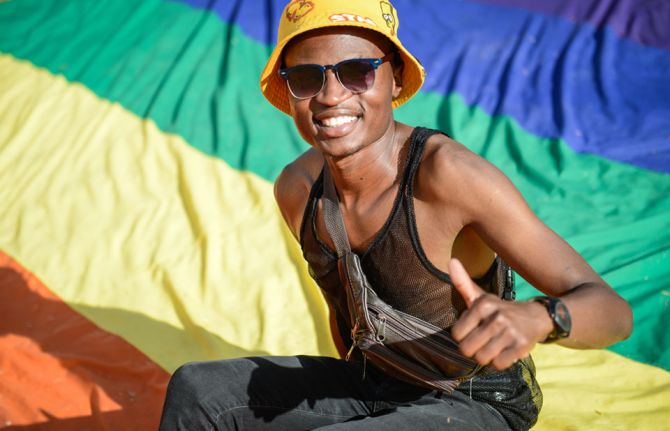

Press Statement
UNAIDS welcomes decision by Gabon to decriminalize same-sex sexual relations
07 July 2020 07 July 2020GENEVA, 7 July 2020—UNAIDS welcomes the decision by Gabon to decriminalize same-sex sexual relations. Following a vote by the Gabon Senate on 29 June 2020, the signing off of the decision by the President means that Gabon has joined a growing list of countries in Africa and beyond that have removed criminal laws that target and discriminate against lesbian, gay, bisexual, transgender and intersex (LGBTI) people.
“I applaud the collective decision by Gabon’s parliament, government and President to decriminalize same-sex sexual relations,” said Winnie Byanyima, UNAIDS Executive Director. “By doing so, Gabon is righting a grave injustice inflicted on the LGBTI community in the country.”
Paragraph 5 of Article 402, which criminalized same-sex sexual relations—with a maximum penalty of six months in prison and a 5 million central African CFA franc fine—was inserted into the new Gabonese Penal Code in July 2019. That paragraph has now been withdrawn. UNAIDS is encouraged that such a step back in terms of human rights can be overturned quickly when communities, civil society, politicians and other allies come together to campaign to right wrongs.
Through legitimizing stigma and discrimination and violence against LGBTI people, the criminalization of same-sex sexual relations stops people from accessing and using HIV prevention, testing and treatment services and increases their risk of acquiring HIV. It is also a profound violation of a basic human right.
Gay men and other men who have sex with men had a 26 times higher risk worldwide in 2019 of HIV acquisition than all adult men. Prohibitive legal and policy environments created by stigma and discrimination are key barriers to dramatically reducing new HIV infections. While UNAIDS calls for the removal of such discriminatory laws, a critical immediate step would be to stop enforcing them.
“This is a very welcome step towards equality for LGBTI people in Gabon,” added Ms Byanyima. “I call on the at least 69 other countries and territories around the world that still criminalize same-sex sexual relations to do the decent thing: stop criminalizing people because of who they love.”
UNAIDS
The Joint United Nations Programme on HIV/AIDS (UNAIDS) leads and inspires the world to achieve its shared vision of zero new HIV infections, zero discrimination and zero AIDS-related deaths. UNAIDS unites the efforts of 11 UN organizations—UNHCR, UNICEF, WFP, UNDP, UNFPA, UNODC, UN Women, ILO, UNESCO, WHO and the World Bank—and works closely with global and national partners towards ending the AIDS epidemic by 2030 as part of the Sustainable Development Goals. Learn more at unaids.org and connect with us on Facebook, Twitter, Instagram and YouTube.
Contact
UNAIDS GenevaSophie Barton-Knott
tel. +41 79 514 68 96
bartonknotts@unaids.org
UNAIDS Media
tel. +41 22 791 4237
communications@unaids.org
Press centre
Download the printable version (PDF)
